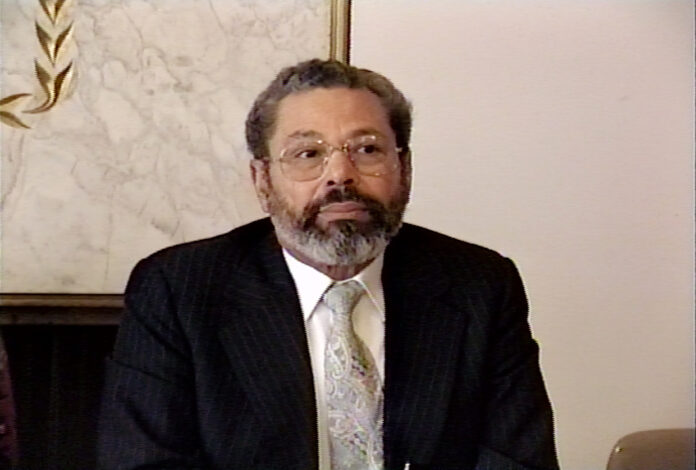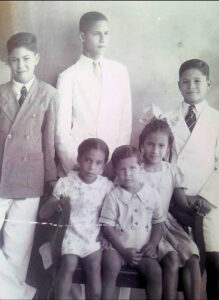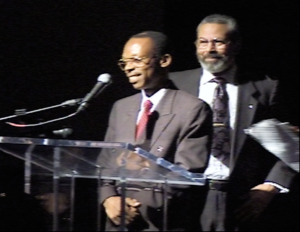
(Français)
Benjamin Dupuy, arguably Haiti’s greatest communist leader and ideologue from the 1970s to the 2010s, passed away in a Miami Beach nursing home on Apr. 23 at the age of 91. He had been extremely ill and bedridden for many months, suffering from emphysema and suspected lung cancer.
A journalist, photographer, filmmaker, diplomat, organizer, and political party leader, Dupuy was a model Marxist theoretician and man-of-action, unwavering in his life-long pursuit of socialist revolution in Haiti.
Born in Cap Haïtien on Sep. 30, 1931, the fourth of eight children, Ben grew up in many cities – Gonaïves, Aux Cayes, Port-au-Prince, St. Marc – as his father, Georges Dupuy, a high-ranking Haitian Army officer who once was in line to head the Armed Forces, was stationed in different posts around the country.

His mother, Anna Therese Anduoar Dupuy, was Dominican, making him virtually fluent in Spanish.
Having once considered becoming a priest, Dupuy instead became a civil engineer, working on projects like irrigation canals in the Artibonite Valley and a butter factory near Aux Cayes. In the latter city, an Army officer commandeered his work Jeep to pursue the “Jeune Haiti” anti-Duvalierist revolutionaries who had landed near Jérémie in 1964.
Fidel Castro’s successful insurgency in Cuba’s Sierra Maestra mountains just across the Windward Passage had inspired that ill-fated guerilla incursion just as it inspired Ben and many others of his generation.
Dupuy also worked on the U.S. government-sponsored Geodesic Survey, mapping Haiti’s topography, which took him to all corners of the Maryland-sized country and fired his imagination about the possibilities of recreating a Cuban-style July 26th Movement.
A ham radio enthusiast, Dupuy would spend hours listening to broadcasts from revolutionary Cuba, while also working in Port-au-Prince’s Radio Haiti with people like famed journalist Jean Dominique and Ben’s best friend at the time, Herby Widmaier.
He also had several brushes with death. Tonton Macoutes, Duvalier’s infamous paramilitary corps, almost executed him and a friend when they were stopped driving a car similar to that of François Benoît, an Army marksman, whom François “Papa Doc” Duvalier suspected of trying to kidnap his son, Jean-Claude, from school in 1963.
Finally, a Tonton Macoute, who was later killed by Duvalier, told Ben he had better leave the country because he was marked for arrest for his role in organizing striking workers at the Reynolds Metals bauxite mine in Miragoâne, where he also worked.
In 1965, Ben fled to New York, joining his wife and later bringing three of his four children. He alighted first in Elmhurst, Queens, then moving with his family to White Plains, NY.
Quickly he became involved in New York’s growing anti-Duvalierist Haitian exile politics. Passing through a series of coalitions and organizations, he worked, often contentiously, with many prominent figures of the anti-Duvalierist struggle including Wilson Désir, Paul and Franck Laraque, Fathers Antoine Adrien and William Smarth, Edouard Petit-Homme, Paul Adolphe, Ludovic Dauphin, and Julien Jumelle.
During the early 1970s, Dupuy also worked closely with brothers Raymond and Leo Joseph, publishers of the leading anti-Duvalierist weekly Haïti Observateur. The paper had a major cover story on the testimony Ben gave to the Senate Foreign Relations Committee in 1974. In one testy exchange between Dupuy and Sen. Edward Brooke (R-MA), Brooke sternly asked Dupuy: “Are you advocating the violent overthrow of the Haitian government?” After a short pause, Dupuy replied: “I think you should have posed that question to George Washington about his struggle in 1776.” The witty come-back delighted Haitians.
Indeed, Dupuy by then had formed the Haitian Liberation Movement (MHL), which infiltrated many militants into Haiti and carried out several spectacularly successful clandestine operations, especially after Jean-Claude “Baby Doc” Duvalier succeded his father as Haiti’s “President-for-Life” in 1971.

During the late 1960s, Dupuy worked as an engineer on the building of Route 684 through Westchester County, NY, where he met Jill Ives, who became his long-time partner. After divorces, the two merged their families and moved to various homes during the 1970s and 1980s in upstate New York’s Dutchess and Rockland counties. Each home became a collective household, with young and old revolutionaries of many nationalities engaged in political work, from secret missions in Haiti to leafleting and tabling demonstrations from Poughkeepsie to Washington, DC. They formed the Friends of Haiti, a group which raised political and financial support for the MHL by doing audio visual presentations, speaking engagements, and fundraisers at churches, community groups, and universities as well as publishing a newsletter, animating radio and television shows in NYC, and organizing demonstrations.
Ben became a pilot, flying out of Stormville Airport and working in concert on some intrigues with another Haitian airman, Frantz Gabriel, who flew out of Poughkeepsie Airport and later would become Aristide’s pilot and de facto chief of security.
Dupuy was a model Marxist theoretician and man-of-action, unwavering in his life-long pursuit of socialist revolution in Haiti.
For some years, the Dupuy/Ives commune became a branch of the Canada-based Liberation Support Movement (LSM), which argued that the leading edge of world revolution was the national liberation struggles then raging throughout the Third World, particularly in Africa.
In 1976, Ben then tasked his first lieutenant and Jill’s son, Kim Ives, to produce a 16mm film which could be internationally distributed and explain Haiti’s national liberation struggle. Seven years later, the feature documentary Bitter Cane was released, winning festivals and acclaim worldwide. Prominent artists like Manno Charlemagne, Georges “Moumousse” Vilson, Nicole Levy, and Jean-Claude “Koralen” Martineau all contributed to the film. Dupuy’s historical, political, and economic analysis provided the film’s backbone.
As the film project finished in 1983, Dupuy launched the weekly newspaper Haïti Progrès, whose slogan was “The paper which offers an alternative.” Unlike Haïti Observateur, Haïti Progrès had a trenchantly anti-imperialist stance and attracted the participation of the cream of Haiti’s revolutionary intelligentsia, including the Laraque brothers, Cauvin Paul, Father Gérard Jean-Juste, Anthony Phelps, Frantz “Fanfan” Latour, Guy Roumer, Marie Célie Agnant, Jean Brière, Carl Gilbert, and Raymond Philoctète. In its heyday, it was edited by the French internationalist former school teacher Jeanie Loubet and made possible by a dedicated core including Maude Leblanc, Georges Honorat, François Pierre-Louis, Georgina Montreuil, and former Duvalierist political prisoner Jacques Magloire.
Over the same years, Dupuy’s network spawned a radical Haitian student network and publication called Idées, a Haitian workers-and-tenants organization called the Association of Haitian Workers (ATH), the demonstration-organizing mass organization, the Committee against Repression in Haiti, as well as numerous radio shows and coalitions. In the early 1980s, all these undertakings functioned mostly out of offices based on Flatbush Avenue in Brooklyn, NY.
However, after Duvalier’s fall in February 1986, operations began to shift to Haiti. In April 1987 at St. Jean Bosco (the church of then Father Jean-Bertrand Aristide, who delivered the opening speech), Ben organized a conference which founded the National Popular Assembly (APN), a nation-wide “popular organization” (the U.S. Embassy called it a “pressure group”) which trained hundreds of young militants and established dozens of chapters nationwide.

The APN militants projected the French/Kreyòl version of Bitter Cane (Canne Amère) with a movie projector on walls and bed-sheets in Haitian slums and countryside hamlets, as well as distributed Haïti Progrès, whose arrival by plane from New York thousands of young Haitians anxiously awaited every week for news and analysis of the chaotic post-Duvalier years.
In early 1990, Dupuy held an APN press conference at the Hotel Oloffson where he proposed Aristide to be president. A group of thugs broke up the press conference, but, like a genie, the idea was now out of the bottle, and indeed, a few months later, just weeks before the national election, the National Front for Change and Democracy (FNCD) unceremoniously dumped their first candidate and chose Aristide, which sparked an historic outpouring of voters that became known as “the flood” or Lavalas. Aristide was elected on Dec. 16, 1990 with 67% of the vote when they stopped counting, stunning U.S. election engineers.
Dupuy then became Aristide’s Ambassador-at-Large, traveling to countries worldwide to solicit support for the beleaguered nation. He particularly focused on African nations, of which many Haitians are descendants but which had never established diplomatic relations with Haiti. Dupuy also sought to get support from Libya, which more timorous members of Aristide’s Foreign Ministry feared would anger Washington.
However, the U.S. had already begun planning a coup d’état since the upstart president announced Haiti’s “second independence” in his Feb. 7, 1991 inaugural speech, and on Sep. 30, 1991, Dupuy’s 60th birthday, the Haitian Army ousted Aristide in the first bloody coup d’état against his government.
(Part 2)










[…] 23: Ben Dupuy, a prominent Haitian revolutionary leader for five decades, dies in Miami Beach, FL at the age of […]
[…] into the Haitian Liberation Movement (MHL), led by Ben Dupuy, a dynamic communist revolutionary who died in April 2023. She was part of a progressive student movement called Ideas, helped found the Association of […]